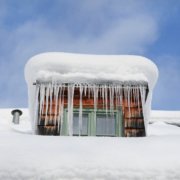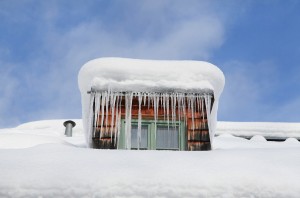 If you’ve ever had a water leak in your own home, you’ll know that small problems can quickly escalate when it comes to water damage. It’s therefore little surprise that `escape of water’ causes approximately £1.8 million of water damage to UK properties every day*. That’s a staggering £20.83 every second! They also account for 21% of all property insurance claims. (*Association of British Insurers – ABI).
If you’ve ever had a water leak in your own home, you’ll know that small problems can quickly escalate when it comes to water damage. It’s therefore little surprise that `escape of water’ causes approximately £1.8 million of water damage to UK properties every day*. That’s a staggering £20.83 every second! They also account for 21% of all property insurance claims. (*Association of British Insurers – ABI).
So what are the most common causes of water damage in holiday homes? How can you reduce the risk in yours?
Those dreaded frozen pipes…
It’s that time of year when frost appears and temperatures can plummet dipping the mercury well beneath freezing overnight. This can be a real issue for holiday homes if left unoccupied. Frozen pipes being one of the most common and expensive causes of water damage in the UK each year.
To ensure you don’t fall foul of our cooler climate always make sure that your:
- pipes are sufficiently lagged
- heating is left on to maintain a minimum temperature throughout your holiday home to prevent pipes from freezing
- holiday home is regularly inspected both externally and internally
Remember saving a few pennies on heating costs can lead to far greater loss through water damage. If you don’t leave the heating on make sure the water is turned off and the system is drained.
- Check your holiday home insurance policy document for full conditions to which you must comply to maintain full cover.
Here’s some more useful information on protecting your holiday home from frozen and burst pipes:
Poor workmanship…
Just like any other area of your holiday home – whether it be your website, your furnishings or your electrics – quality is the key when it comes to avoiding water damage. All maintenance and any changes to your cottage plumbing should be carried out by a professional using appropriate quality materials. Incorrectly installed plastic plumbing and poor quality underfloor heating have contributed to an increase in water damage.
Pipework fatigue and failure
Another common cause of water loss in holiday homes is pipework failure. This will often happen at the point at which one pipe meets another and where the joint is weaker than the pipe itself. Flexible hose tails, often used in confined spaces such as wash basins and to connect washing machines and dishwashers are two common culprits when it comes to failure over time and should therefore be regularly checked and replaced if needed.
Valves and ball cocks are also prone to failure, with all resulting in leaks that can have the potential to escalate quickly if not identified, which is an issue in unoccupied holiday homes and therefore places an increased importance on regularly checking the property yourself or appointing this responsibility to somebody else.
Lack of regular maintenance
We’ve already highlighted the importance of conducting regular checks on your holiday home. These checks not only prevent issues with escaping water, but also identify them early before potential damage can escalate, so it’s unsurprising that a lack of regular maintenance can also cause issues. When was the last time you checked all of the taps, pipe joints, flexible braided hoses, ball cocks and any other potential plumbing nightmares in your cottage? If the answer isn’t within the past few months, then the time is now to avoid any future damage and disruption.
Our free water leak action pack could help reduce water damage in your holiday home
We’re always keen to help our holiday homeowners before issues occur, which is why we offer our policy holders a free Water Leak Action Pack which contains:
- Guidance on preventing water leaks
- What to do if you, your housekeeper or guests discover a leak
- Somewhere to record where your stopcock is to be found
- Labels and stickers to clearly mark your stopcock
- Somewhere to record contact numbers in case of a leak
There’s a good chance we have already supplied you with a free Water Leak Action Pack for your holiday home, are you using yours? Find out more here.
Boshers are specialist providers of holiday home insurance. For information on how we can help protect your holiday let business ,call us on 01237 429444.


 We spend all day talking to holiday home and cottage owners across the UK,
We spend all day talking to holiday home and cottage owners across the UK,